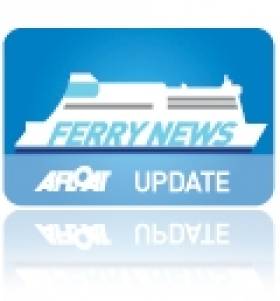Displaying items by tag: Donaghadee RNLI Lifeboat
New Shop Volunteers Needed to Help at Donaghadee RNLI and Stations Across Island of Ireland
The RNLI is looking for new shop volunteers to join its lifesaving team at Donaghadee RNLI in Co Down — and stations across the island of Ireland.
Just like the charity’s lifeboats, the RNLI’s retail team need a dedicated volunteer crew — people of all ages and abilities — who can give a little time to help save lives at sea.
Alma Mason has been the Shop Manager at Donaghadee RNLI since April last year and along with her team of volunteers, she works to ensure the shop on the seafront is open daily from 1-4pm.
"I was always aware of the importance of the RNLI’s lifesaving work as I was a Stena Line purser on the Dublin to Liverpool ferry route for 12 years," Alma explains. "Living in Donaghadee, I also knew most of the volunteer lifeboat crew. When I saw the advertisement last year for a shop manager, I knew I had some time to give and I applied for the role."
 Alma Mason, Shop Manager at Donaghadee RNLI
Alma Mason, Shop Manager at Donaghadee RNLI
As for what she finds most rewarding about being involved, Alma says: "What I have learned so much more about since volunteering is the difference the funds raised through the shop can make.
"It is rewarding to know that in some small way by giving your time you have helped to raise the vital funds to help save lives at sea and that when you see the lifeboat launching, you know the volunteer crew are going out with the best of training, kit and equipment to do what they need to do."
Alma is encouraging others to get involved: "You can gain some invaluable skills and training whilst volunteering at a shop and can become part of an incredible team.
"If you enjoy meeting and interacting with people, are confident in handling money, it really is a role you will love."
RNLI shops started out as simple cake stalls run by volunteers to raise money for their local lifeboat station.
"These stalls started selling commemorative RNLI products in around 1920 and quickly moved on to selling souvenirs and Christmas cards with all profits helping save lives at sea," Nuala Muldoon, RNLI Community Manager explained.
"Today, we have over 170 RNLI shops around the coast and inland, all of which are still run by our dedicated volunteers. They attract many visitors throughout the year and stock an excellent range of unique souvenirs and gifts.
"The pandemic, unfortunately, hit our shops hard as they closed for periods of time in line with Covid-19 restrictions. We were delighted when we could reopen them safely in accordance with government guidance and are looking forward to welcoming our visitors in 2022.
"To do this successfully, we want to grow our team of shop volunteers and are looking for people who enjoy interacting with others, can help us to provide a high level of customer service and ensure our shops continue to be friendly and welcoming places."
Currently, shop volunteers are being sought by various lifesaving teams around the island of Ireland — in Portrush; Sligo Bay; the Aran Islands; Youghal, Ballycotton and Castletownbere in Co Cork; Dunmore East in Co Waterford; Courtown, Wexford and Kilmore Quay; Dun Laoghaire in Co Dublin; and Clogherhead in Co Louth.
To find out more about how you can help generate vital funds, promote the work of the RNLI, and apply, go here
Captain Arrested after Belfast Lough Collision
#FERRY NEWS - The captain of the 1,500 tonnes cargo vessel Union Moon which was involved in a collision with the passenger ferry Stena Feronia in Belfast Lough last night, has been arrested by police, according to BBC News.
An investigation is under way after the accident which happened about a mile and a half from shore between Carrickfergus and Helen's Bay.
The 27,000 tonnes Stena Feronia was on its way from Birkenhead, Merseyside, to Belfast when the collision happened at about 19:45 GMT.
Coxswain of Donaghadee Lifeboat Philip McNamara said the Union Moon, was brought back to Belfast.
No one was injured, but both vessels were substantially damaged. The Maritime and Coastguard Agency (MCA) said both captains had been breathalysed, to read more about this story click HERE.




























































